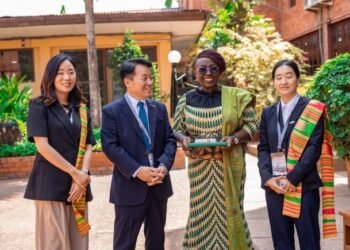Musicians have long been known for struggling to make a living solely from their music careers.
Many musicians face financial challenges due to streaming services paying low royalties, limited opportunities for live performances, and the impact of the COVID-19 pandemic on the music industry.
As a result, some musicians have had to seek alternative sources of income to support themselves and their art.
RelatedPosts
There are various ways in which musicians diversify their income streams, such as teaching music lessons, composing music for film, TV, or advertising, selling merchandise, offering online concerts or workshops, and licensing their music for use in various media.
Building a strong online presence through social media and streaming platforms also helps musicians reach a wider audience and generate income through avenues like crowdfunding and fan support.
Ghanaian rap sensation, Teephlow, has advised his fellow musicians to seek out additional sources of income to improve their lives.
He believes that if artists pay too much attention to what others say about them, they will struggle to succeed in their craft.
The rapper, known in private life as Lukeman Ekow Baidoo, made this assertion during a live video on social media.
“They will tell you to stay in your comfort zone, but these people are not ready to invest in your career. How can a man who has gone to KNUST and has a degree in quantity surveying limit himself to music? They paid my school fees so that if my talent fails, I can fall on something else.
“So why should I limit myself? Don’t listen to Ghanaians because they will not invest in you. You can do music even when you’re outside the country. Do not let anyone limit you.”
Teephlow
Teephlow recalled how his education provided a safety net, enabling him to pursue music without financial worry.
“You have a family and you have bills to pay, so if your passion is not making the cut, try to put things in place to sort out your bills. Then, if the bills are sorted, you can focus on your passion. With this in place, you don’t have to think about how you can invest in your passion without any form of stress.”
Teephlow
Teephlow’s remarks underscored the practicality of balancing passion with financial responsibility, urging artists to prioritize their economic well-being while pursuing their creative endeavors.
The key to improving a musician’s livelihood is to think creatively and explore different ways to monetize their talents.
By diversifying their income streams and seeking out new opportunities, musicians increase their earning potential and achieve greater financial stability in an industry that is notoriously difficult to navigate.
Musicians Seeking Another Possibility of Income Sources

Several Ghanaian musicians have sought alternative sources of income to supplement their livelihoods due to the unpredictable nature of the music industry.
Known as the “Grandpapa” of Hiplife music in Ghana, Reggie Rockstone is not only a musician but also a businessman. He is the co-founder of the popular nightclub franchise, Django Bar, which has multiple locations in Ghana.
Okyeame Kwame, a Ghanaian rapper and musician is also a successful entrepreneur. He is involved in various business ventures, including a fashion line called “OK Impressions” and a health initiative called the “OK Foundation.”
Trigmatic is a musician and radio presenter who has diversified his income streams by venturing into agriculture. He is known for his passion for farming and has a farm where he grows crops such as maize and vegetables.
Desmond Blackmore, known as D-Black, is a Ghanaian musician and entrepreneur. Apart from his music career, he is the CEO of Black Avenue Muzik and has investments in real estate and the hospitality industry.
Many more talented Ghanaian musicians have sought alternative sources of income to ensure a more stable livelihood outside of the music industry.
READ ALSO: GSE Reaches Historic Milestone with Over GHS 90 Billion Market Capitalization























